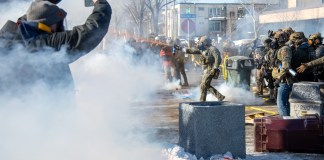By Wayne Campbell
The world is becoming increasingly hostile towards women and girls. Sadly, by now, each one of us may know of someone who has been targeted with gender-based violence. What is equally disturbing is the fact that the public silence regarding gender-based violence is increasingly deafening.
Credit: UN Media
One area of the world where the spotlight dims regarding the rights of women and girls is the Sahel region of Africa. The Sahel, meaning “the shore” in Arabic, is a vast area crossing 6,000 kilometers from East to West Africa. It covers many geographic and agro-ecological systems, includes 12 countries and is home to 400 million people. The political region of the Sahel, as defined by the The United Nations integrated strategy for the Sahel (UNISS), covers 10 countries (Senegal, Gambia, Mauritania, Guinea, Mali, Burkina Faso, Niger, Chad, Cameroon and Nigeria).
The region faces many challenges. Climate change threatens to further degrade land, vegetation, water resources and food systems through increased incidence of drought, desertification and floods. Added to that, the most recent report from United Nations (UN) Women paints a bleak and troubling picture concerning the plight and status of women and girls.
UN Women states that in Africa’s Sahel region, deepening violence and poverty driven by displacement, hunger and terrorism are stripping women and girls of their rights to safety, education and a viable future. According to UN Women Executive Director Sima Bahous, risks to women and girls across this vast region are severe and systemic, as political instability, environmental collapse and a declining international presence take their toll. From abductions and child marriage to exclusion from schools and public life, their lives and opportunities are being steadily stripped away. In an address to ambassadors in the UN Security Council, Bahous said crises due to increasing terrorism, poverty, hunger, a crumbling aid system and shrinking civic space are “converging violently and disproportionately on their bodies and their futures.”
Life is being erased
It is very obvious that what is being done to women and girls is intentional. In countries like Burkina Faso, Mali, Niger and Chad, life for women under extremist control “is one of erasure from public space,”
Bahous said. Their movement, visibility and even clothing are heavily restricted. Schools have been burned or shut down, leaving more than 1 million girls without access to education.
“Abduction is not a by-product of terrorism in the Sahel, it is a tactic,” Bahous said, noting that in Burkina Faso alone, the number of women and girls abducted has more than doubled over the past 18 months.
In Mali, 90 percent of women are affected by female genital mutilation. Rates of child marriage in parts of the region are among the highest in the world. Maternal mortality driven by early pregnancy and poverty is among the world’s worst.
There are commonalities among the countries of the Sahel region; they are deeply rooted in patriarchy and are politically unstable. Both indicators place more pressure on the rights of women and girls.
Dwindling global attention
In spite of increasing needs, international support is waning. Perhaps, this is because there are so many hotspots in the world today competing for global attention or it could be that Africa is not seen as a major player in the scheme of global affairs. The situation is dire.
Climate change only deepens the hardship, with extreme heat and drought increasing both mortality and food insecurity across the region. “The distances women and girls travel for water or firewood are growing longer, while their safety is shrinking,” Bahous said. Two-thirds of women surveyed report feeling unsafe during these journeys.
Leonardo Santos Simão, head of the UN Office for West Africa and the Sahel (UNOWAS), also warned that a deteriorating security environment marked by waves of jihadist attacks and political turbulence is undermining progress and fuelling displacement. He added that shrinking space for media, civil society and women’s organizations is threatening hard-won gains and that a broader crisis is undermining governance and peace building efforts.
Empowerment of women
Empowering women involves fostering their social, economic, political and educational advancement. This can be achieved through various strategies, including providing access to education and healthcare, promoting economic opportunities, advocating for legal rights, and fostering supportive communities. Additionally, challenging gender stereotypes and promoting positive role models are crucial for creating a more equitable society.
The international community should not abandon the Sahel region. It is time for nations to give some attention to this almost forgotten region. One such way is by increasing development assistance to the region and holding governments accountable. Additionally, there needs to be some interrogation of cultural and traditional practices regarding how women are treated. The protection of women, as well as a commitment to uphold gender equality, are critical pillars for sustainable development and growth. Will the international community stand with the women of Sahel?
In the words of Michelle Obama, the empowerment of women is the key to unlocking the potential of a nation.
The opinions expressed in this commentary are those of the writer and not necessarily those of the AFRO.
Great Job Wayne Campbell & the Team @ AFRO American Newspapers Source link for sharing this story.



